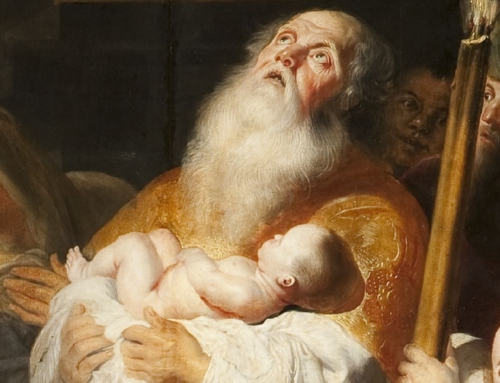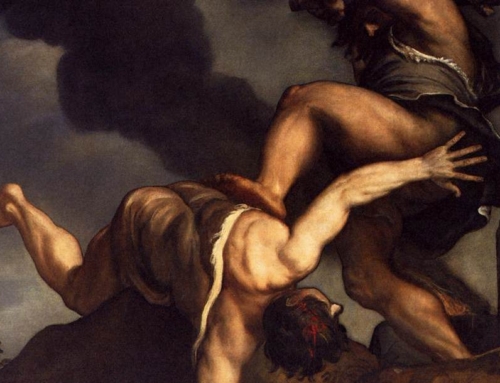This is part of a series entitled, “One-Line Wonders.” Read the series introduction here. To see other posts in the series, click here.
The Lord gave and the Lord has taken away;
blessed be the name of the Lord! (Job 1:21)
Until this world passes away the Church will ponder the mystery of the Book of Job. “In the land of Uz there was a blameless and upright man named Job, who feared God and avoided evil” (Job 1:1). The very first line tells us all we need to know of Job, that he was truly a good man. He adhered to the first principle of the law of nature, as Saint Thomas would articulate it: “the first precept of law, that good is to be done and pursued, and evil is to be avoided” (ST I-II, q. 94, a. 2). God had nothing on Job. God even boasts of how good Job is (Job 1:8). He was as righteous as could be.
And then, for no reason known to Job, Job suffers. “The satan,” that is, the “accuser,” as the earlier use of the term was understood, is permitted by God to test Job to prove the strength of his faith. Job endures a slew of misfortune. His wealth is destroyed. How can one who has lost everything to an economic recession or a house fire not feel sympathy? His children die in tragedy. How can the parent who has lost a child to miscarriage or cancer not see the senselessness of it? But Job’s reply sounds absurd: “Then Job arose and tore his cloak and cut off his hair. He fell to the ground and worshiped. . . . In all this Job did not sin, nor did he charge God with wrong” (Job 1:20, 22).
Turning to more severe tactics, the satan afflicts Job “with severe boils from the soles of his feet to the crown of his head” (Job 2:7). Job’s reaction continues to sound almost naive, frustratingly patient: “We accept good things from God; should we not accept evil?” (Job 2:10). The following thirty chapters witness three of Job’s friends debating with him, trying to get him, at first, to accept his discipline and, eventually, to repent of whatever has caused his punishment. Job’s righteousness seems less and less sure as the book progresses. Job complains. Job speaks more and more carelessly of God’s justice. At last, God breaks into the dialogue: “Where were you when I founded the earth? Tell me, if you have understanding” (Job 38:4) . . . “Will one who argues with the Almighty be corrected? Let him who would instruct God give answer!” (Job 40:2).
Suffering is not rational. It cannot be explained away by straightforward answers because it is evil, which is by definition a frustration of the good. The anchor of one’s faith and hope in the midst of seemingly pointless suffering has to be God, who is Goodness itself. I think that any man or woman who has suffered—who still suffers—would be tempted to take the advice of Job’s friends, or even Job’s wife, who told him to “curse God and die!” (Job 2:9). But it’s dust and ashes for Job (Job 42:6): Job repents of his presumption to know God’s designs, and all is returned to him in greater abundance. He is a lesson to the sufferer, because “the fear of the Lord is wisdom; and avoiding evil is understanding” (Job 28:28).
If you are still at a loss, you wouldn’t be alone. If God is all good, why the suffering? The providence of God may be mysterious to one who suffers. But that is because we live in a confused world, tainted by sin. “All have sinned and are deprived of the glory of God” (Rom 3:23). “There is not one who does what is good, not even one” (Ps 53:4). These truths aren’t easy to swallow, not when the house burns down or the child dies. Sometimes in the life of faith, the rubber meets the road. To have faith in the bright days when all is sunshine and calm is easy. To keep faith when the tempest tosses is objectively hard. But what is faith if only good for fair weather? The Lord gave and the Lord has taken away.
Of course, the rationale of Job’s plight must be seen in the light of a higher wisdom, a truth which can glimpse beyond the endless questions of suffering. For “who has known the mind of the Lord, so as to counsel him? But we have the mind of Christ” (1 Cor 2:16). The theme of give and take—the mystery of suffering in God’s providence—finds its fulfillment in Christ. As the Exsultet of the Easter Vigil sings, “O love, O charity beyond all telling, to ransom a slave you gave away your Son!” God understands suffering because he chose to suffer. Knowing he would suffer, Christ was willing to “bless the name of the Lord” in thanksgiving. As Saint Gregory the Great reminds us,
When he is described to be drawing near to his Passion, he is said to have taken bread and given thanks. And so he gives thanks who is bearing the stripes of the sins of others. (Moralia in Job Book II, ch. 61)
Only love can bring clarity to the worst of suffering. “Love is strong as Death” (Song 8:6). Love Incarnate is even stronger than death, rising from the tomb to transcend all suffering, as Job would understand: “As for me, I know that my vindicator lives, and that he will at last stand forth upon the dust” (Job 19:25). Tears will give way to worship. When the Magdalene comes to the tomb, “they said to her, ‘Woman, why are you weeping?’ She said to them, ‘They have taken my Lord, and I don’t know where they laid him’” (John 20:13). The object of our worship will help us along: “He will wipe every tear from their eyes, and there shall be no more death or mourning, wailing or pain, [for] the old order has passed away” (Rev 21:4). In the meantime, as we plod our way in this vale of tears, take comfort that the Lord has charted the course: “Blessed are you who are now weeping, for you will laugh” (Luke 6:21). Blessed be the name of the Lord!
✠
Image: Ilya Repin, Job and His Friends







